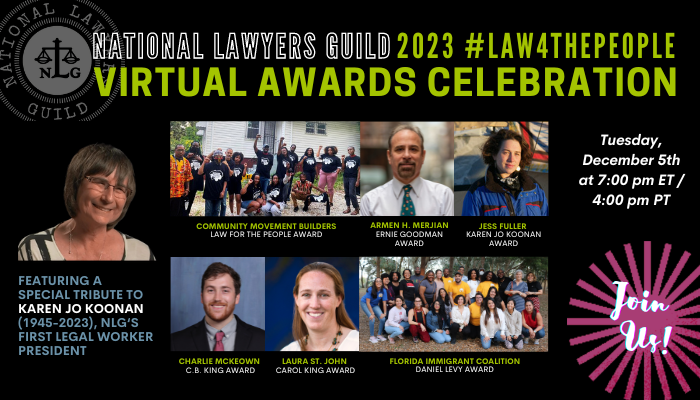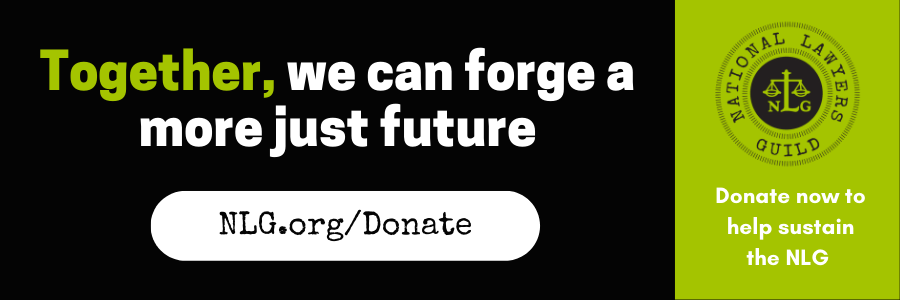
Hugo Chávez in Brazil, 2003. (Photo: Victor Soares – ABr – Agência Brasil)
A year after the death of Hugo Chávez is a propitious time to examine his legacy. Such an examination is even more important in light of the current wave of demonstrations in Venezuela, which have given new life to the transparent attempts of the opposition and the United States to depose the Bolivarian government. These demonstrations appear to be organized by an especially violent and reactionary sector of the opposition, seeking overthrow rather than democratic change. The more covert history of US attempts at “regime change” is detailed by Eva Golinger in her book, The Chávez Code: Cracking U.S. Intervention in Venezuela which, while focusing on Venezuela, reveals the true global aims of the US Agency for International Development. The current US strategy is discussed by Mark Weisbrot of the Center for Economic and Policy Research at CounterPunch.
The National Lawyers Guild has had a long camaraderie with the Venezuelan people and representatives of the Bolivarian Government of Venezuela. Our first delegation visited in 2006 and, since then, at least four others have accompanied various elections. One of the great privileges I enjoyed as NLG president was being afforded the opportunity to visit twice to accompany the opposition primary and the presidential elections in 2012. Notably – contrary to what one might hear in this country – the opposition did have primary elections, which were run quite smoothly by the National Electoral Council (CNE). Over the years, the Guild has been honored with the presence of representatives of the Bolivarian government, including Supreme Court judge Fernando Ramón Vegas Torrealba and the head of its CNE, Tibisay Lucena. Thus, while my personal experience in Venezuela is limited to its electoral process, my understanding of the Bolivarian government is, through the Guild and other sources, much broader. Both are worth considering, particularly in the face of the unrelenting criticisms of the Venezuelan government coming from official United States sources and the bourgeois media here. It is worth exploring why so much energy and resources are devoted to attacking a tiny South American country which, despite its oil wealth, would not at first blush appear critical to the US empire’s strategic interests.
ELECTIONS
I have participated, as an observer or supervisor, in elections in Bosnia, Croatia, Armenia and Macedonia, as well as Venezuela. My wife, who also accompanied the opposition primary election, has vastly more election experience than I. And those we worked with in the Venezuelan elections included election officials from throughout Latin America and the world. The virtually unanimous opinion of all is that Venezuela has the most sophisticated and accurate vote-tallying system in the world. Voters are able to verify their vote before they are finally logged in to the computers and paper receipts of each ballot are retained. Half the polling stations do a hand count of the receipts to verify they correspond to the computer-tabulated count. The entire process is run by the CNE, a separate branch of government responsible only to ensure that balloting is free and fair (by contrast, elections in the fifty states are run by the various secretaries of state, who ascend to their positions through partisan elections and often inject that partisanship in the conduct of future elections). While Ms. Lucena, a graduate of the New School in New York City, is a member of Chavez’s United Socialist Party of Venezuela, those who work for the CNE are well-trained professionals dedicated to insuring the election process is free, fair and transparent.
Over the years, the process has improved as electoral accompaniers have observed and reported on problems and made suggestions. The CNE has seriously considered suggestions – ranging from ways to insure the privacy of each vote to providing chairs and other assistance for disabled voters waiting in line – to make sure that the process affords every Venezuelan the opportunity to exercise the franchise. In Venezuela (and pretty much everywhere else), one must present an identification card to be allowed to vote. The difference, however, between the way in which voter identification has been used there and the discriminatory way it is being used in the United States, is that the CNE goes to extraordinary lengths to insure that every eligible citizen has ID. Rather than requiring voters to travel to courthouses or other locations, the CNE goes to the voters. Voter registration in Venezuela is almost universal and turnout routinely exceeds 80% of eligible voters.
When Chávez was alive, the US continually criticized him for monopolizing the national media and preventing access to it by his opponents, as if any sitting chief executive in this country, whether a president or governor, does not use the office to enhance his reelection prospects and the future prospects of his party. I was only in Venezuela immediately before and during the actual voting, so I do not have personal knowledge of the entire process and whether opposition parties were restricted in their ability to campaign effectively. However, the CNE brought opposition representatives as well as reporters and academics to speak to us about the process. They did so freely and expressed both their concerns and their confidence in the voting process itself. It is also worth noting that if the government controls the public media in Venezuela, the opposition dominates the private media, which continues to operate despite the fact that it was instrumental in organizing and promoting the abortive coup in 2002. That is to say, the private media that is still operating today in Venezuela committed treason more than a decade ago. Yet it continues to account for the vast majority of media outlets and viewership served.
One of the more revealing exchanges I recall was prior to the election, when we visited a polling station and spoke with the Chavista and opposition representatives there (party observers are present at every polling station in the country and are not shy about expressing their opinions). The Chavista expressed confidence in the outcome but, when asked what would happen if Chávez lost, simply shrugged and said, “Then we’ll be the opposition.” Both men had complete confidence in the fairness of the election process itself and real pride in it. The final point they made while shaking hands was that, despite their political differences, the most important thing was that they were “both Venezuelans.” It should be emphasized that the accompaniers had complete freedom to speak with whomever they wished and ask whatever they wanted.
THE CHÁVEZ LEGACY
One of the reasons the fairness of the electoral process in Venezuela is of such significance is that a critical component of the socialist experiment in Venezuela is its commitment to democracy (Hugo Chávez’s early coup attempt was unsuccessful, but the validity of his repeated election victories is undeniable). Certainly, he used his position, as well as his charisma, to advocate strongly for changes he wanted to see, but he never imposed them on an unwilling population. Indeed, that is the course that has, from time to time, been followed by the opposition with the backing of the US government with money, expertise and political pressure. Parenthetically, earlier today I learned of the death of Chokwe Lumumba who, like Chávez, was committed to both revolutionary change and democratic processes. He, like Chávez, believed that poor people, alienated from the usual political battles between representatives of one or another billionaire faction. Both proved that validity of that belief in practice.
The adoption of the Bolivarian constitution was carried out with massive popular participation and then adopted by popular vote. When a referendum defeated a proposal to eliminate term limits for various elective offices in 2007, Chávez did not impose a change from above as, for example, Michael Bloomberg did in New York City. He went back to work to convince the people to adopt it and, in 2009 succeeded with a second referendum.
Every step of the Bolivarian revolution has included the entire population. The changes may not be as sweeping as they might have been if the party in power simply ruled by decree as has happened with prior socialist experiments, but the changes have the benefit of genuine support following free and open debate, thereby enhancing the likelihood of permanence. The change can be seen, in fact, by the nature of the Venezuelan opposition. In this country, the political center has moved so far to the right that so-called “liberal” politicians, including Barack Obama and Bill Clinton, are well to the right, on pretty much all matters economic, of such past Republican stalwarts as Dwight Eisenhower and Richard Nixon, if not Ronald Reagan himself. By contrast, the opposition candidate on the last two elections, Henrique Capriles Radonski, has campaigned on a populist platform of preserving many of the Bolivarian reforms, with the claim that he will make corrections that will address the undeniable and longstanding problems of crime and poverty that Venezuela has not yet solved. In the United States, he would be a liberal, but not in Venezuela. Despite his “liberalism,” the US prefers him to Chávez.
All of which brings me back to the question of why Venezuela is so important to the United States. Why, for example, did it question the results of President Maduro’s election while recognizing without question the legitimacy of a flawed election in Honduras (see the Truthout article by Guild colleagues Lauren Karasik, Susan Scott and Azadeh Shashahani here.)? Why did it, and all the bourgeois US media, to their great embarrassment and everlasting shame, recognize the “government” established after the 2002 Venezuelan coup attempt that crumbled within two days? Why is tiny Venezuela such a threat to what every US politician claims to be the greatest nation in the history of the universe?
Hugo Chávez did not just change the direction of Venezuela; he was a driving force behind the changes Latin America has seen in recent years towards independence from US domination. Other Latin American countries have not traveled the same political path as has Venezuela, but they have veered far from the path of the “Monroe Doctrine,” towards independence and democracy. President Zelaya of Honduras began the process and was overthrown in a coup, which the United States criticized with little vigor for a few days before recognizing the new, illegitimate government. But elsewhere, those changes have been more permanent. In Brazil, the Workers’ Party of Lula da Silva and now, Dilma Rousseff, has held power for more than a decade. Evo Morales, Bolivia’s first president of indigenous ancestry, is charting a new direction there. In opposition to US aims and policy, the Mercosur countries of Brazil, Argentina, Uruguay, Paraguay, and Venezuela condemned the current attempts at destabilization by the opposition in Venezuela.
Just as Cuba has been the target of a vicious and unlawful US blockade for decades, because of the ideological threat it poses to the United States – despite its insignificance as an economic threat – so too is Venezuela now in the crosshairs of US foreign policy. Because of its oil wealth, it is a bit less vulnerable than Cuba but, at the same time, a greater danger to US domination. And it now has allies throughout the Americas. It is notable that, in the United Nations system, the US and Canada are part of Europe rather than the Americas. Nevertheless, the US sees this hemisphere as subject to its dominance (okay, it sees the whole world that way, but ever since James Monroe the Americas are particularly seen as being within its sphere of influence). Whatever happens to the Bolivarian revolutionary experiment, however far it goes, to whatever extent it succeeds, Hugo Chávez will always be remembered for his role in bringing together Latin America in opposition to US imperial domination. The Bolivarian experiment is ongoing and it is yet to be the degree of its success. So, too, the history of Chavez’s contributions to the advancement of human rights has yet to be determined, much less written. It is nevertheless certain that those contributions are substantial. It is their degree, not the fact they have been made, that remains to be seen.
Postscript: The NLG International Committee’s Task Force on the Americas has numerous reports from delegations to various Latin American countries.
Following are links to the reports from its Venezuela delegations:



